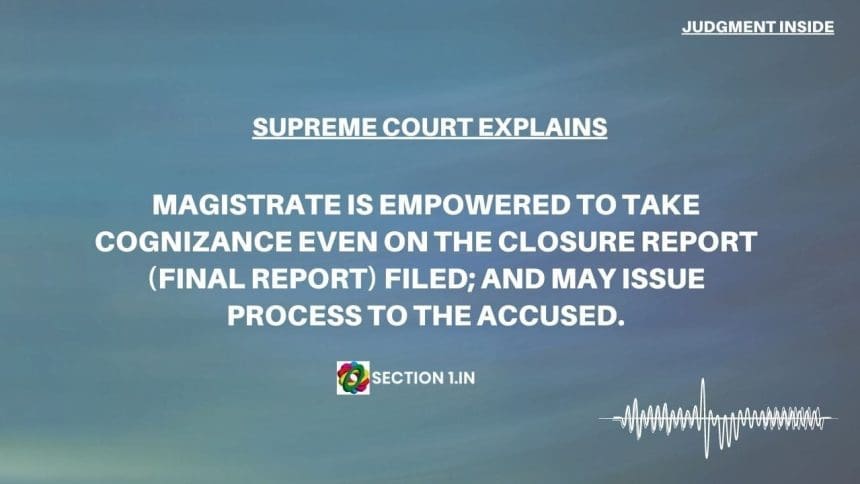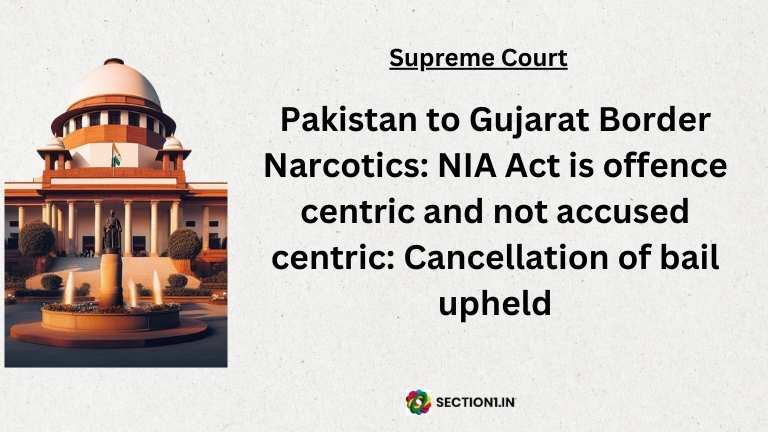Investigation and its procedure
Before we examine the contentions of the learned counsel for the appellant and the second respondent, we may briefly refer to some of the provisions in Chapter XII, XIV, XV and XVI of the Code. Section 155 in Chapter XII pertains to information laid to the police regarding non-cognizable cases and Sub-Section (2) lays down that no police officer shall investigate a non-cognizable case without the order of a Magistrate having power to try such case or commit the case for trial. Section 156(1) confers power on an officer in charge of a police station to investigate any cognizable case without the order of a Magistrate. Section 156(3) authorises a Magistrate, empowered under Section 190 to order the police to make an investigation as provided for in Section 156(1). The other provisions in the Chapter from Section 157 onwards set out the powers of investigation of the police and the procedure to be followed. Section 169 prescribes the procedure to be followed by an officer in charge of a police station if it appears to him upon investigation of a case that there is no sufficient evidence or reasonable ground of suspicion to justify the forwarding of the accused to a Magistrate. Section 170 prescribes the procedure to be followed by the officer in charge of a police station if it appears to him upon investigation that there is sufficient evidence or reasonable ground of suspicion to justify the forwarding of the accused to a Magistrate. Section 173(1) enjoins a Police Officer to complete the investigation without unnecessary delay. Section 173(2) lays down that as soon as the investigation is completed the officer in charge of a police station should forward to a Magistrate empowered to take cognizance of an offence on a police report, a report in the prescribed form stating the various particulars mentioned in that Sub-Section.
Section 190 Cr.P.C: Initiation of proceedings
Chapter XIV deals with the conditions requisite for initiation of proceedings and as to the powers of cognizance of a Magistrate. For our purpose it is enough if we extract Section 190(1) alone.
“Section 190(1). Cognizance of offences by Magistrates subject to the provisions of this Chapter, any Magistrate of the first class, and any Magistrate of the second class specially empowered in this behalf under sub-section (2), may take cognizance of any offence-
(a) upon receiving a complaint of facts which constitute such offence;
(b) upon a police report of such facts;
(c) upon information received from any person other than a police officer, or upon his own knowledge, that such offence has been committed.”
Complaints to Magistrate
Chapter XV which contains Section 200 to 203 deals with “Complaints to Magistrate”.
A Magistrate taking cognizance of an offence on complaint is required by Section 200 to examine the complaint and the witnesses present, if· any. Section 202 provides that a Magistrate taking cognizance of a case, upon complaint, may, if he thinks fit, postpone the issue of process against the accused, and either inquire into the case himself or direct investigation to be made by a police officer or by such other person as he thinks fit, for the purpose of deciding whether or not there is sufficient ground for proceeding. Section 203 empowers the Magistrate to dismiss the complaint, if after considering the statements on oath (if any) of the complainant and of the witnesses and the result of the inquiry or investigation (if any) under Section 202, the Magistrate is of opinion that there is no sufficient ground for proceeding.
Issuance of process
Chapter XVI deals with “Commencement of Proceedings before Magistrates” and Section 204 empowers a Magistrate to issue summons or a warrant as the case may be, to secure the attendance of the accused if in the opinion of the Magistrate taking cognizance of the offence there is sufficient ground for proceeding.
From the provisions referred to above, it may be seen that on receipt of a complaint a Magistrate has several courses open to him. The Magistrate may take cognizance of the offence at once and proceed to record statements of the complainant and the witnesses present under Section 200. After recording those statements, if in the opinion of the Magistrate there is no sufficient ground for proceeding, he may dismiss the complaint under Section 203. On the other hand if in his opinion there is sufficient ground for proceeding he may issue process under Section 204. If, however, the Magistrate thinks fit, he may postpone the issue of process and either inquire into the case himself or direct an investigation to be made by the police officer or such other person as he thinks fit, for the purpose of deciding whether or not there is sufficient ground for proceeding. He may then issue process if in his opinion there is sufficient ground for proceeding or dismiss the complaint if there is no sufficient ground for proceeding. Yet another course open to the Magistrate is that instead of taking cognizance of the offence and following the procedure laid down under Section 200 or Section 202, he may order an investigation to be made by the police under Section 156(3). When such an order is made, the police will have to investigate the matter and submit a report under Section 173(2). On receiving the police report the Magistrate may take cognizance of the offence under Section 190(1)(c) and issue process straightaway to the accused. The Magistrate may exercise his powers in this behalf irrespective of the view expressed by the police in their report whether an offence has been made out or not. This is because the police report under Section 173(2) will contain the facts discovered or un-earthed by the police as well as the conclusion drawn by the police therefrom. If the Magistrate is satisfied that upon the facts discovered or unearthed by the police there is sufficient material for him to take cognizance of the offence and issue process, the Magistrate may do so without reference to the conclusion drawn by the Investigating Officer because the Magistrate is not bound by the opinion of the police officer as to whether an offence has been made out or not. Alternately the Magistrate, on receiving the police report, may without issuing process or dropping the proceeding proceed to act under Section 200 by taking cognizance of the offence on the basis of the complaint originally submitted to him and proceed to record the statement upon oath of the complaint and the witnesses present and thereafter decide whether the complaint should be dismissed or process should be issued.
Magistrate is empowered take cognizance on the closure report and issue process
The position is, therefore, now well settled that upon receipt of a police report under Section 173(2) a Magistrate is entitled to take cognizance of an offence under Section 190(1)(b) of the Code even if the police report is to the effect that no case is made out against the accused. The Magistrate can take into account the statements of the witnesses examined by the police during the investigation and take cognizance of the offence complained of and order the issue of process to the accused. Section 190(1)(b) does not lay down that a Magistrate can take cognizance of an offence only if the investigating officer gives an opinion that the investigation has made out a case against the accused. The Magistrate can ignore the conclusion arrived at by the investigating officer; and independently apply his mind to the facts emerging from the investigation and take cognizance of the case, if he thinks fit, in exercise of his powers under Section 190(1)(b) and direct the issue of process to the accused. The Magistrate is not bound in such a situation to follow the procedure laid down in Section 200 and 202 of the Code for taking cognizance of a case under Section 190(1)(b) though it is open to him to act under Section 200 or Section 202 also. The High Court was, therefore, wrong in taking the view that the Second Additional Chief Metropolitan Magistrate was not entitled to direct the registration of a case against the second respondent and order the issue of summons to him.
The fact that in this case the investigation had not originated from a complaint preferred to the Magistrate but had been made pursuant to a report given to the police would not alter the situation in any manner. Even if the appellant had preferred a complaint before the learned Magistrate and the Magistrate had ordered investigation under Section 156(3), the police would have had to submit a report under Section 173(2). It has been held in Tula Ram & Ors. vs. Kishore Singh, [1978] 1 SCR 615 that if the police, after making an investigation, send a report that no case was made out against the accused, the Magistrate could ignore the conclusion drawn by the police and take cognizance of a case under Section 190(1)(b) and issue process or in the alternative he can take cognizance of the original complaint and examine the complainant and his witnesses and thereafter issue process to the accused, if he is of opinion that the case should be proceeded with.
Party
INDIA CARAT. PVT. LTD. v. STATE OF KARNATAKA & ANR – FEBRUARY 15, 1989 -1989 SCR (1) 718.
https://main.sci.gov.in/jonew/judis/8034.pdf
India Carat Pvt. Ltd vs. State of Karnataka





